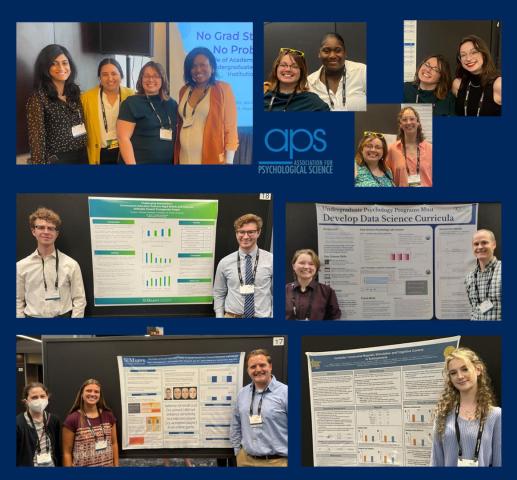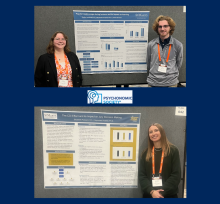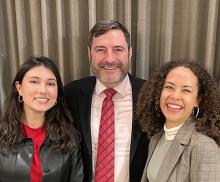
The St. Mary’s College of Maryland (SMCM) Department of Psychology had a strong showing at the Annual Meeting of the Association for Psychological Science in Washington, DC in late May. Contributors to the conference were students Strummer Condayan ‘27, Sadie Gryzmalski ’26, Amy Ludden ’27, and Elsa Oates ’26; alumni Molly Antinucci ’25, Thomas Brennan ’25, Sanai Chase ’25, Drew Sonnenberg ’22, Shannon Lutz ‘25 and Jayden Washington ‘25; Professor of Psychology Aileen Bailey, Assistant Professor of Psychology Anandi Ehman, Associate Professor of Psychology Kristina Howansky, Associate Professor of Psychology Gili Freedman, Assistant Professor of Psychology Nayantara Kurpad, Assistant Professor of Psychology Jessica Leffers, Associate Professor of Psychology James Mantell, and Assistant Professor of Psychology Victoria Muller Ewald.
Antinucci presented a poster “Investigating the Connection between Adverse Childhood Experiences and Childhood Pituitary Gland Volume” based on her St. Mary’s Project conducted with Müller Ewald and Ehman. While most existing literature focuses on the negative neurobiological outcomes of adverse childhood experiences (ACEs) in adulthood, this novel study explores whether such impairments may begin as early as childhood–during the time the trauma is occurring. Using a pre-recorded public dataset, the study analyzed fMRI scans of children aged 4 to 11 years. The pituitary gland was specifically examined due to its critical role in regulating the stress response. Although the results of this preliminary study were not significant, there is still a plethora of evidence to support the hypothesis that ACEs can lead to neurobiological changes in childhood. Understanding the neurobiological impact of ACEs is essential for identifying why these negative outcomes occur and for developing early interventions aimed at preventing both ACEs and their long-term effects.
Chase presented a poster “Rattles and Realities: A Qualitative Study on Postpartum Mood Disorders” based on her SMP conducted with Ehman. Data gleaned from semi-structured interviews showed just how much postpartum mental health depends on feeling seen, heard, and supported. Some moms shared how a kind provider or supportive partner made all the difference, while others felt alone, judged, or brushed off when they needed help most. It’s clear that postpartum care can’t be one-size-fits-all—we need systems that make room for real conversations, cultural understanding, and gentle, ongoing emotional support.
Brennan and Condayan presented “Challenging Essentialism: Chromosome Education Reduces Rigid Beliefs and Improves Attitudes Toward Transgender People” which was based on directed research conducted with Howansky. Learning about sex chromosome complexity increased beliefs about the universality of transness, improved attitudes toward transgender individuals, and reduced beliefs about gender immutability - but did not change other essentialism components nor attitudes toward non-binary individuals.
Ehman and Oates presented two directed-research-based posters. The first poster, which Elsa was the primary presenter on, “Majority Rules: Differences in Attitudes About Sexual Violence as a Function of Gender Identity and Sexual Orientation Status,” surveyed 639 college students in the United States and found that individuals who identified as a member of a marginalized community (e.g., sexual or gender minority) reported lower acceptance of rape myths, held fewer sexist beliefs, and showed a lower endorsement of the right-wing authoritarian political ideology. However, no differences were found between majority and minority identity groups in terms of victim blame in specific sexual assault scenarios, suggesting that future sexual assault prevention work should not only emphasize dismantling sexism and rape myths broadly, but also as they relate to specific incidents of violence (e.g., date rape). In the second poster, “Your Body, My Choice: Right-Wing Authoritarianism, Rape Myth Acceptance, & Sexism Predict Engagement in Sexual Aggression and Coercion,” gender & rape myth acceptance were significantly associated with engagement in sexually coercive behavior. Sexism moderated the relationship such that individuals who endorsed more sexist beliefs were less impacted by specific rape myths. This work was elaborated upon in Professor Ehman’s flash talk of the same name, wherein analyses demonstrated that rape myth acceptance, right-wing authoritarianism, and sexism were not associated with bystander behavior. This suggests that while sexual assault prevention should focus on reducing negative biases and beliefs (e.g., sexism), that it may also be important to offer practical support to bystanders (e.g., help identifying when and how to intervene) in order to maximize their involvement in reducing sexual violence.
Freedman, Sonnenberg and Lutz presented two posters, coauthored by colleagues at the University of Texas at Austin. “The Language of Social Rejection: How Deflections May Soften the Blow for Rejectors and Rejectees” represents a key step in understanding how individuals can construct rejections that will soften the blow of an unpleasant social interaction by showing that both rejectors and rejectees prefer rejections with deflections such as “nothing personal” compared to rejections without deflections. In “The Roles of Social Cost and Power in Social Sensitivity Toward Rejected Individuals” results showed that salience of social cost (vs. power) did not enhance sensitivity to a rejected player (vs. accepted player) in an online game. This may suggest that socially rejecting someone is a strong situation (i.e., a situation with strong norms), and social power and social cost may matter more in weak situations.
Both studies were supported by the collaborative grant awarded by the NSF to Freedman in 2020 for the project “Collaborative Research: Lessening the Blow of Social Rejection."
Freedman was also an invited speaker on a panel entitled "Gender and Culture in Policy: Translating Research into Impactful Action" along with Ms. Gloria Blackwell (CEO, American Association of University Women) and Dr. Aixa Cintrón-Vélez (Program Director, Russell Sage Foundation) with Dr. Shiza Shahid moderating. In this panel, she talked about her research on decreasing gender biases through game and narrative interventions.
Mantell and Gryzmalski presented their poster, coauthored with Washington and Bailey, “Undergraduate Psychology Programs Must Develop Data Science Curricula.” The work was supported by a National Science Foundation (NSF) grant awarded to Mantell and Bailey in 2023.
Ludden presented a poster, coauthored by Müller Ewald and several colleagues at the University of Iowa, entitled “Cerebellar Transcranial Magnetic Stimulation and Cognitive Control in Schizophrenia”. Based on a directed research project, this study highlighted how targeted, noninvasive stimulation to the cerebellum improved cognitive function such as attention and response inhibition in patients with schizophrenia. These findings help address the broader need to find interventions for the cognitive challenges that current treatments overlook. It suggests that the cerebellum and connecting circuits could be a key part in restoring cognitive function and some mental clarity for those living with schizophrenia.
Finally, Ehman, Kurpad and Leffers co-led a critical round table with Moriah Covington (adjunct professor for SMCM’s Center for Career and Professional Development) on “No Grad Students? No Problem: of Academics at Primarily Undergraduate Teaching Institutions” as part of a symposium organized by Ehman. This work involved the discussion of the realities of serving as a faculty member at a predominantly undergraduate teaching and serving institution (PUI) and outlined the unique research, pedagogical, and mentorship opportunities available to instructors at institutions in this group, like SMCM.



